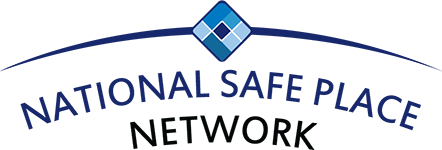National Slavery and Human Trafficking Prevention Month
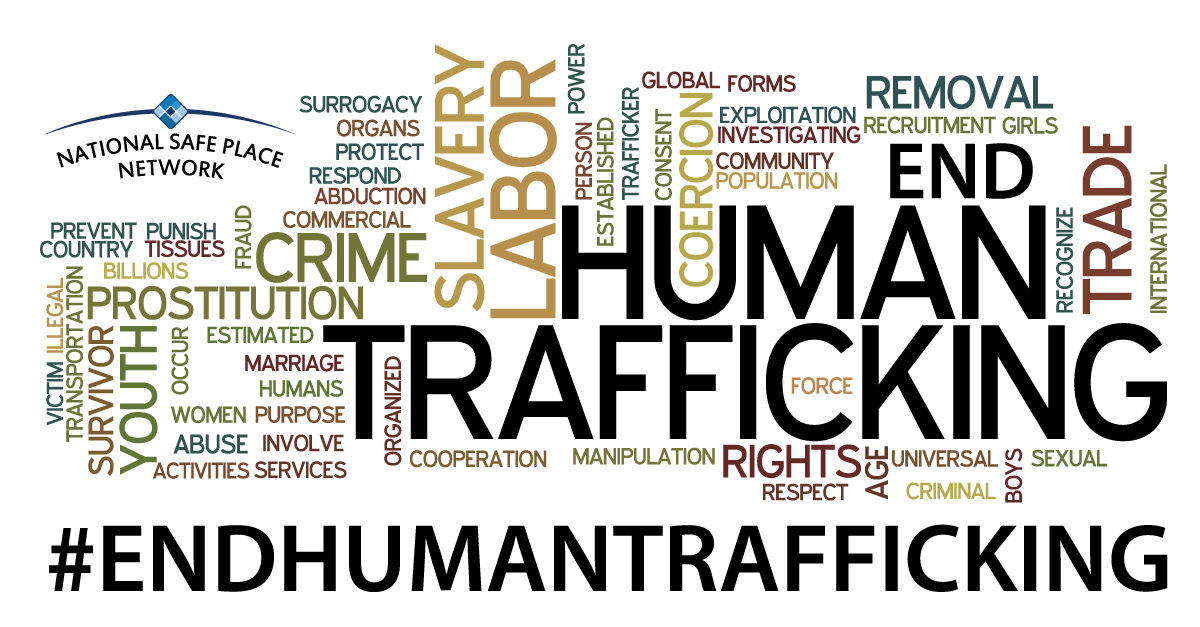
January is National Slavery and Human Trafficking Prevention Month, also known as National Human Trafficking Awareness Month. We encourage you to join us throughout the month as we come together to raise awareness of human trafficking and combine our efforts to prevent it.
We have an action-packed month filled with a variety of activities including webinars, blogs, social media outreach, and other educational and awareness-building activities. These activities were planned to make it easy for YOU to learn more about human trafficking and make a difference. Learn more, share the resources with others, take action if you suspect trafficking, and celebrate the survivors of this terrible crime.
About Human Trafficking
The Trafficking Victims Protection Act of 2000 (TVPA) defines “severe forms of human trafficking” as, "The recruitment, harboring, transportation, provision, or obtaining of a person for:
- Sex trafficking in which a commercial sex act is inducted by force, fraud, and coercion, or in which the person inducted to perform such act has not attained 18 years of age; or,
- Labor or services, through the use of force, fraud, and coercion for the purpose of subjection to involuntary servitude, peonage, debt bondage, or slavery."
Trafficking in persons, or human trafficking, is a widespread form of modern-day slavery. It's a crime that involves the exploitation of a person for the purpose of compelled labor or a commercial sex act through the use of force, fraud, or coercion. If a person younger than 18 is inducted to perform a commercial sex act, it is considered a crime regardless of whether there is any force, fraud, or coercion. Human traffickers target all populations around the world and in our own neighborhoods: women, men, youth, children, citizens, non-citizens, English speakers, non-English speakers. Some groups, such as runaway and homeless youth, native individuals, domestic violence victims, and LGBTQ population are particularly vulnerable to human trafficking. Victims are recruited and lured by traffickers with the false promise of a better life, love, and job opportunities. Later, traffickers use violence, threats, and manipulation to controls their victims. Homeless youth who are forced to trade sexual acts with an adult in exchange of something of value (i.e. shelter, food) are considered victims of domestic sex trafficking.
Human trafficking is the fastest growing criminal enterprise of this century, growing from a nine billion to a 32 billion dollar global industry in a little over a decade. There is no typical trafficker, and it has been shown that traffickers can be parents or other close family members, family friends, boyfriends/girlfriends, employers, smugglers or strangers. Traffickers can be part of an organized enterprise or can work alone. Street gangs, for example, are known to traffic minors into the drug and sex markets. Don’t ignore the facts. Slavery exists and we can work together to end it.
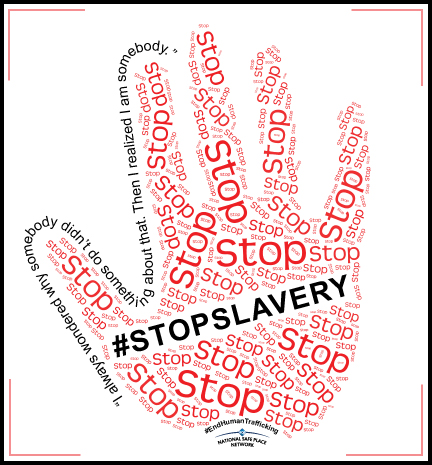
Get Involved
Are you “aware” of how much raising awareness makes a difference? It’s not uncommon to hear someone ask “How does raising awareness actually help make a difference?” Unfortunately, some people choose to ignore awareness campaign efforts because they believe they are not making a difference. If you’ve heard this question – or even asked it yourself – try breaking the term “raising awareness” down.
Raising – to increase the amount, level, or strength of.
Awareness – knowledge or perception of a situation or fact.
Raising awareness increases the amount of knowledge you have about a specific topic such as human trafficking, therefore increasing the efforts to put an end to it. It’s up to you - and all of us - to work together to end human trafficking. Consider the cost of your decision.
Ready to start making a difference now? Spread the word. Let others know what you're learning about each week during the month. If you're using social media, feel free to use the hashtag #EndHumanTrafficking.
Sample Social Media Posts:
Facebook:
While slavery is often considered to be a thing of the past, we know that millions of men, women and children are trafficked in the U.S. and other countries around the world. Traffickers use force, fraud or coercion to lure victims into labor or commercial sexual exploitation. January is National Slavery and Human Trafficking Prevention Month, a time to share information about slavery and human trafficking in order to effect change that will ultimately #EndHumanTrafficking.
Twitter:
It’s National Slavery & Human Trafficking Prevention Month. Learn how you can get involved in the fight to #EndHumanTrafficking
|
What Do You Do To Help Yourself and Others Learn Better?
National Safe Place Network (NSPN) attended the 2016 National RHY Grantees Conference in November where we asked participants, “What do you do to help yourself or others learn better?” We received so many great tips. Here are just a few:
- “I try to make workshops friendly and offer sweets."
- “Biofeeds = 10 minutes of soothing music that relaxes staff or individuals.”
- "In helping others and myself to learn I like to keep things basic and simple."
- "Study with candy. Eat a piece of candy while studying, then eat the same candy before the test. Helps you remember."
- "Hear. Write. Say. Do"
- "I share info and knowledge as soon as I get it. Also offer encouragement."
- "Offering paper and pens are crucial. Notes lead to doodling which keep the brain engaged."
- "Repeat everything being spoken in your head to reinforce what you've heard to commit it to memory."
- "Whatever your background is, let it push you forward, not backward."
- "Staying current on everything related to youth culture."
- "Human trafficking prevention is what we want to learn more about."
- "I believe in an open communal learning environment where each person brings something different to the table."
- "No TV or radio - quiet and little distraction."
Thanks to those of you who stopped by the NSPN table last month and provided tips! It was great seeing some familiar faces and meeting new members.
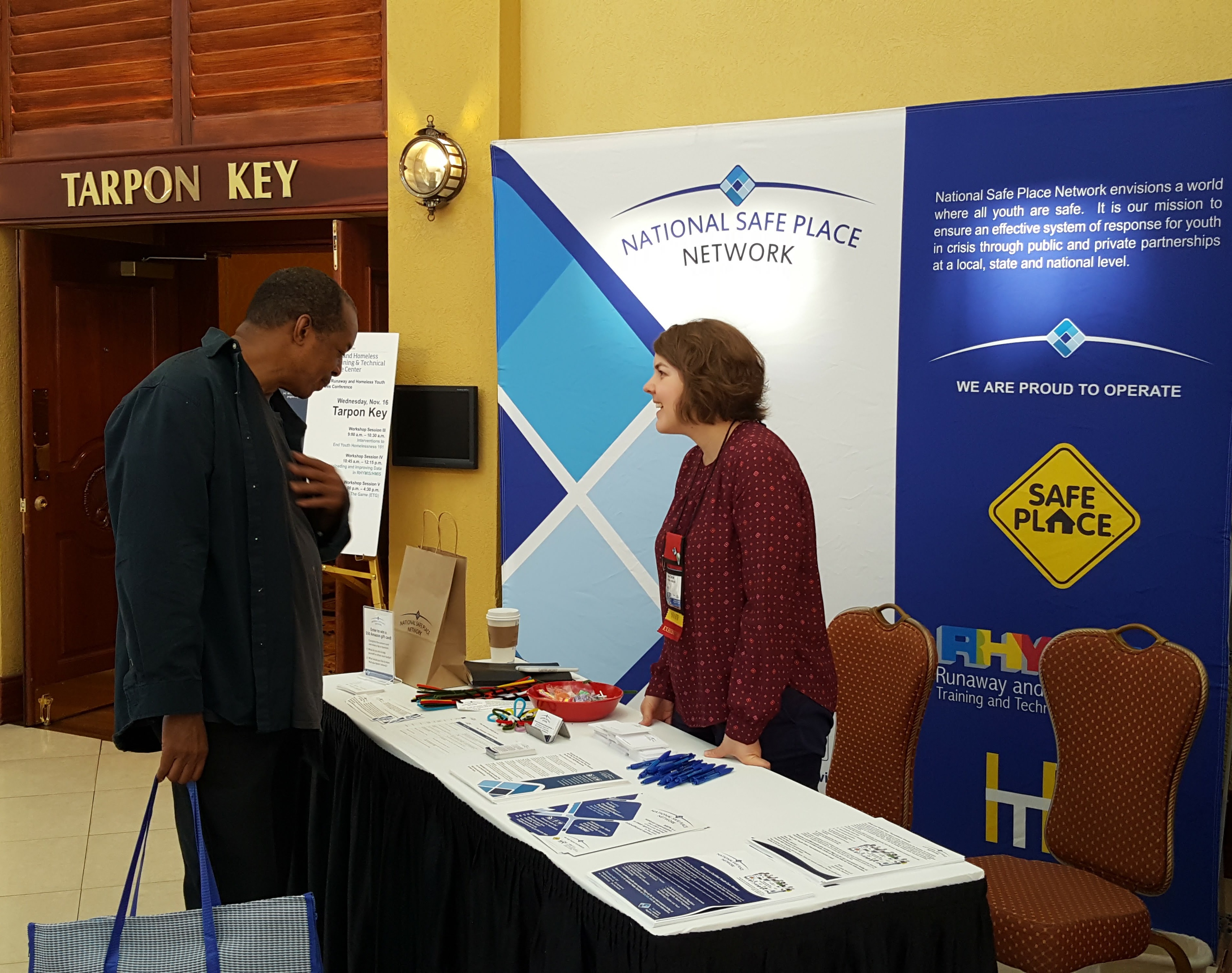
|
2016 NSPN Awards
Youth service professionals, dedicated volunteers, and community organizations constantly work diligently to strengthen youth and families in communities across the country. National Safe Place Network is honored to recognize those making a difference in the lives of youth and families.
NSPN is pleased to recognize the 2016 NSPN Award winners:
Community Involvement Award
The Boys and Girls Club of Fresno County is the recipient of the 2016 Community Involvement Award. The organization has partnered with Fresno EOC Sanctuary and Youth Services for the past 15 years, providing in-kind services estimated at more than $45,000, volunteers and event staff, and free event space. The Boys and Girls Club of Fresno County has been a reliable and strong Safe Place site partner and offer program support by educating young people about Safe Place and promoting the program during National Safe Place Week. To learn more about the Boys and Girls Club of Fresno County, please click here: http://bgclubfc.org/
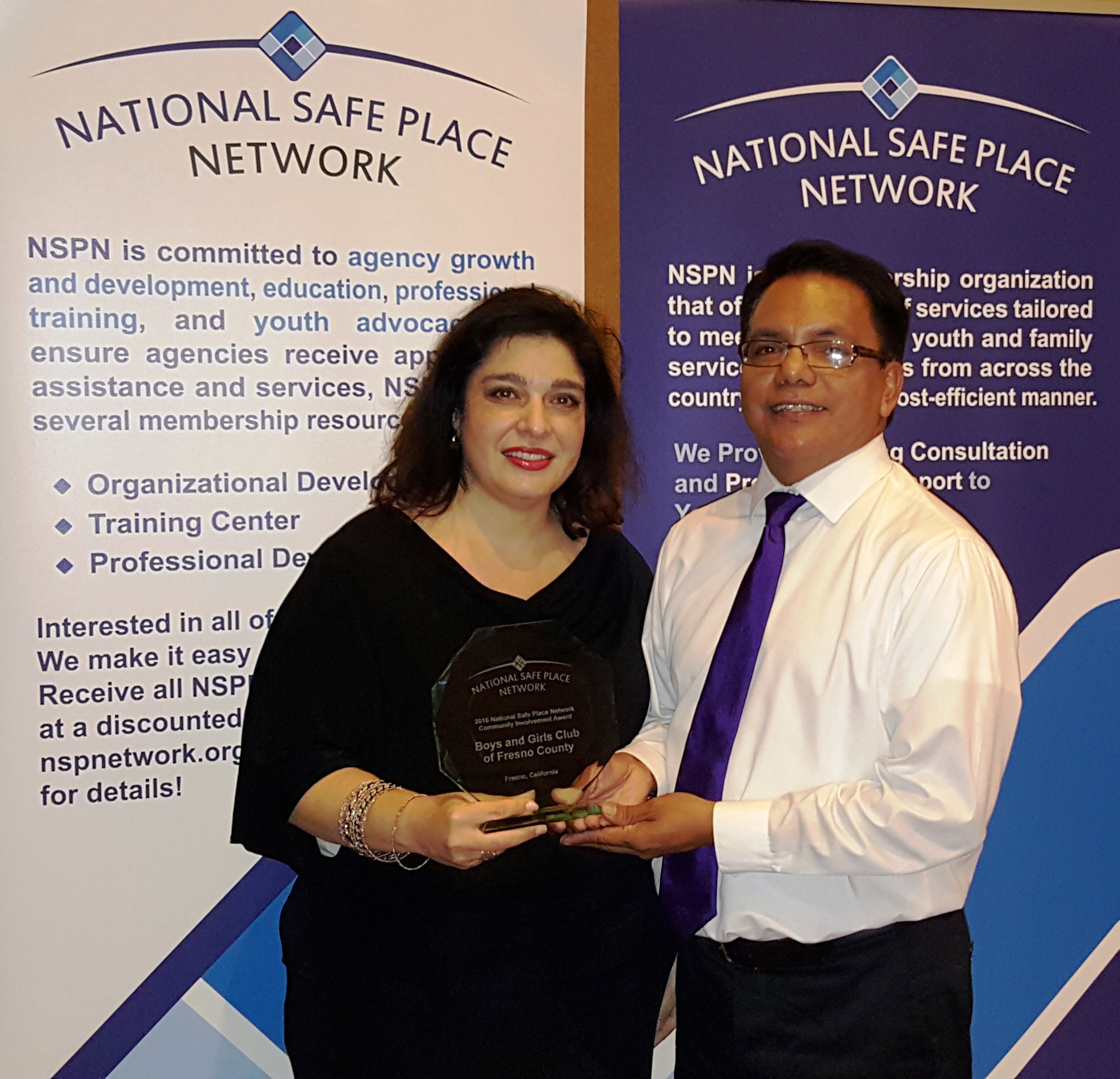
Executive Leadership Award
Arash Ghafoori, Executive Director of the Nevada Partnership for Homeless Youth (NPHY), is the recipient of the 2016 Executive Leadership Award. Arash has been called "an outstanding professional, mentor, teacher, and colleague, but most of all, an excellent leader." NPHY was embroiled in controversy and on the brink of closing when Arash took over as Executive Director. He has since implemented national best practice, improved client-level data systems, and successfully managed the agency budget and provided meaningful service delivery.
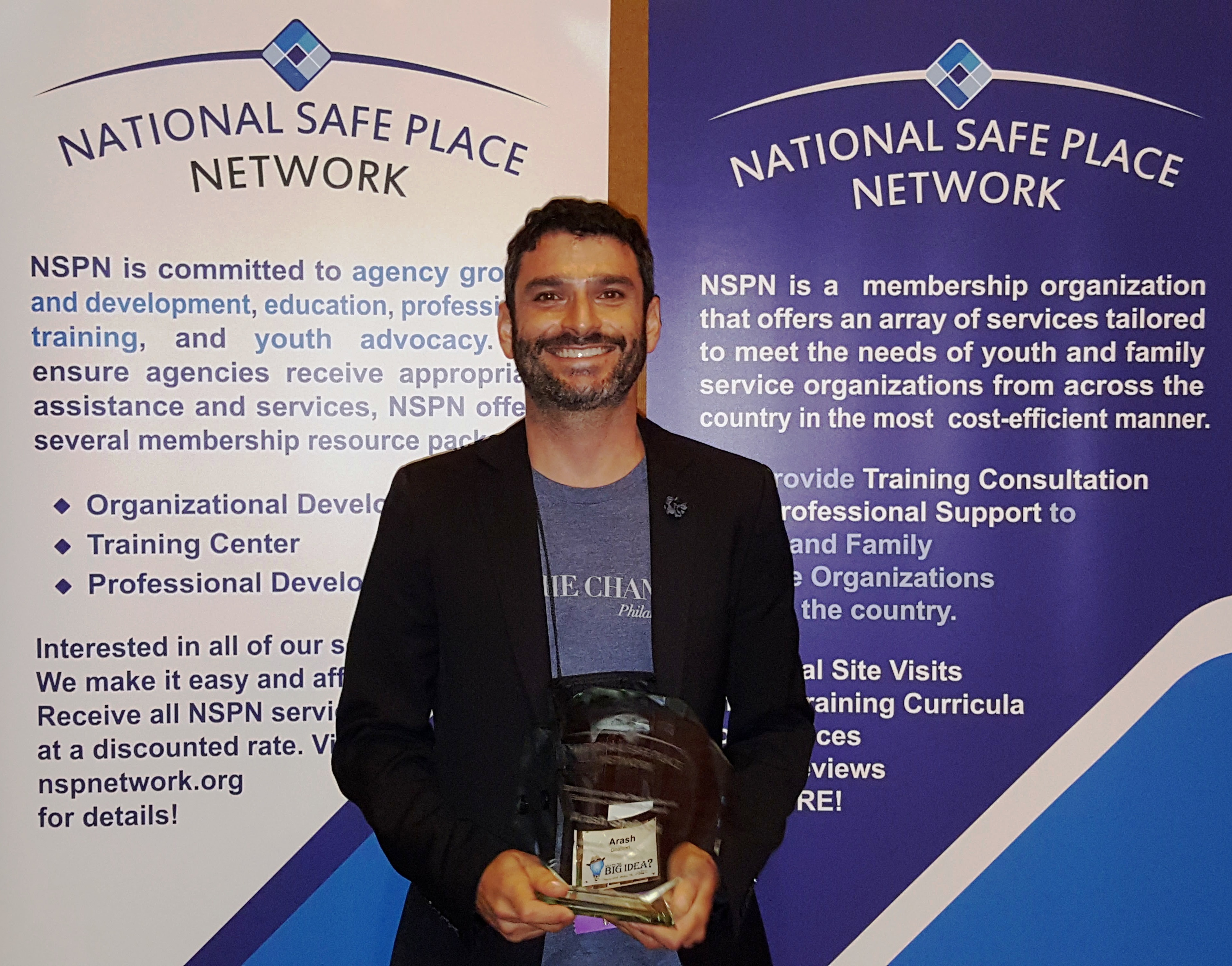
Lifetime Achievement Award
Shirley Caylor, CEO & Co-founder of the Crisis Center, Inc. in Gary, Indiana, is the recipient of the 2016 Lifetime Achievement Award. Shirley has worked tirelessly for 45 years to provide needed services to youth and families in Northwest Indiana. She co-founded the Crisis Center, Inc. in 1971, serving as Associate Director for 15 years, Executive Director for 28 years, and has been the CEO for the last two years. Shirley has enhanced the lives of those in need by providing high quality programs for little or no cost to recipients. Learn more about Shirley Caylor at: http://www.crisiscenterysb.org/staff.htm
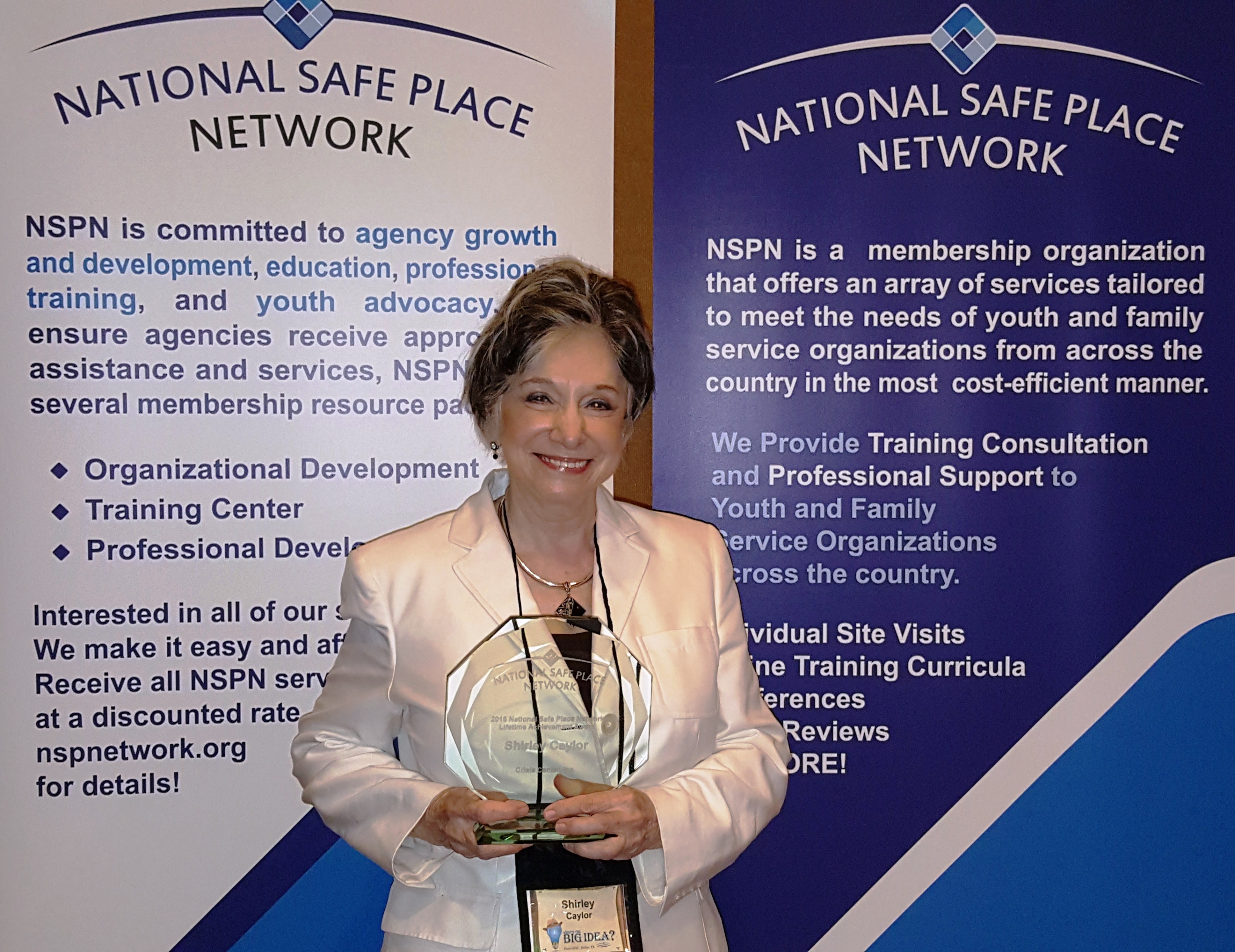
Model Program Award
The Foundation for Youth is the recipient of the 2016 Model Program Award. Through long-established and new community partnerships, Foundation for Youth garnered the commitment of the local mental health agency to answer any Safe Place calls and meet with youth to determine necessary services, case management, and counseling. The organization recruited their Communities that Care business partners to serve as Safe Place sites throughout the community and formed new parterships with city and county govenment departments to support the program. To learn more about Foundation for Youth, please visit: http://www.foundationforyouth.com/
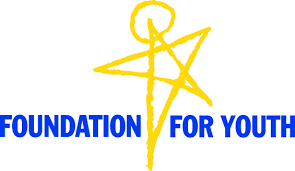
Together We Can Award
Angela Craig, Teen Services Coordinator for the Charlotte Mecklenburg Library System, is the recipient of the 2016 Together We Can Award. Angela is an outstanding leader in providing services to teens in the Charlotte community. She creates opportunities with other agencies to connect with the library's teen area and is extremely collaborative with the community's efforts to provide services for the homeless population. Angela played a key role in bringing on all of the library branches as Safe Place partners with the Relatives Inc.
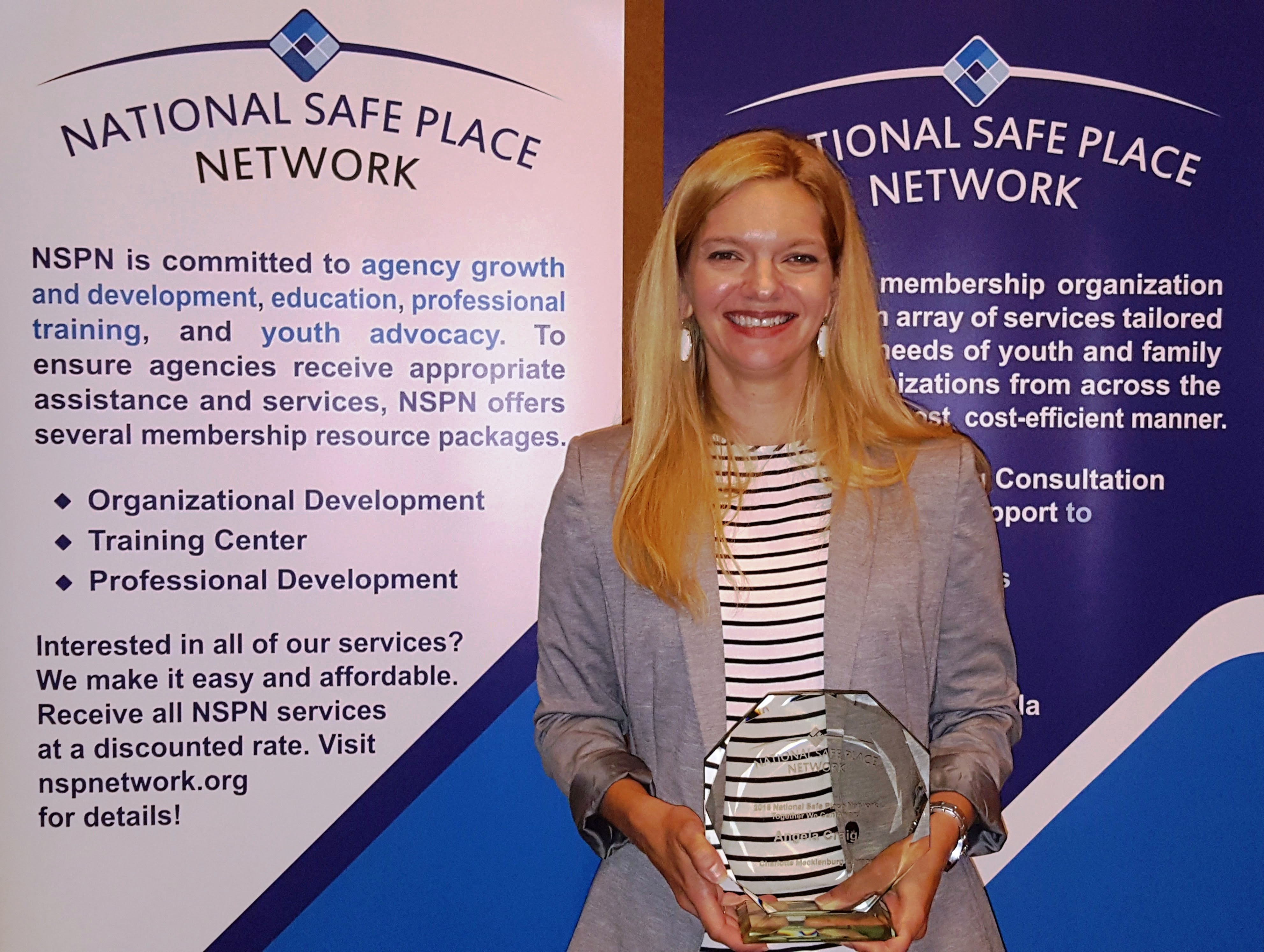
Safe Place Coordinator of the Year
Karen Sieve is the 2016 Safe Place Coordinator of the Year. Karen is the Regional Safe Place Program Manager for Youth in Need in St. Charles, Missouri, a role she has held for the past eight years. During her tenure, Karen has worked to quadruple the number of Safe Place sites in the area and has been instrumental in fundraising, student outreach, and media relations efforts. She also values advocacy and empowers youth and families to advocate for themselves. Learn more about Karen Sieve at: http://www.youthinneed.org/ABOUTUS/AgencyOverview/OurStaff.aspx
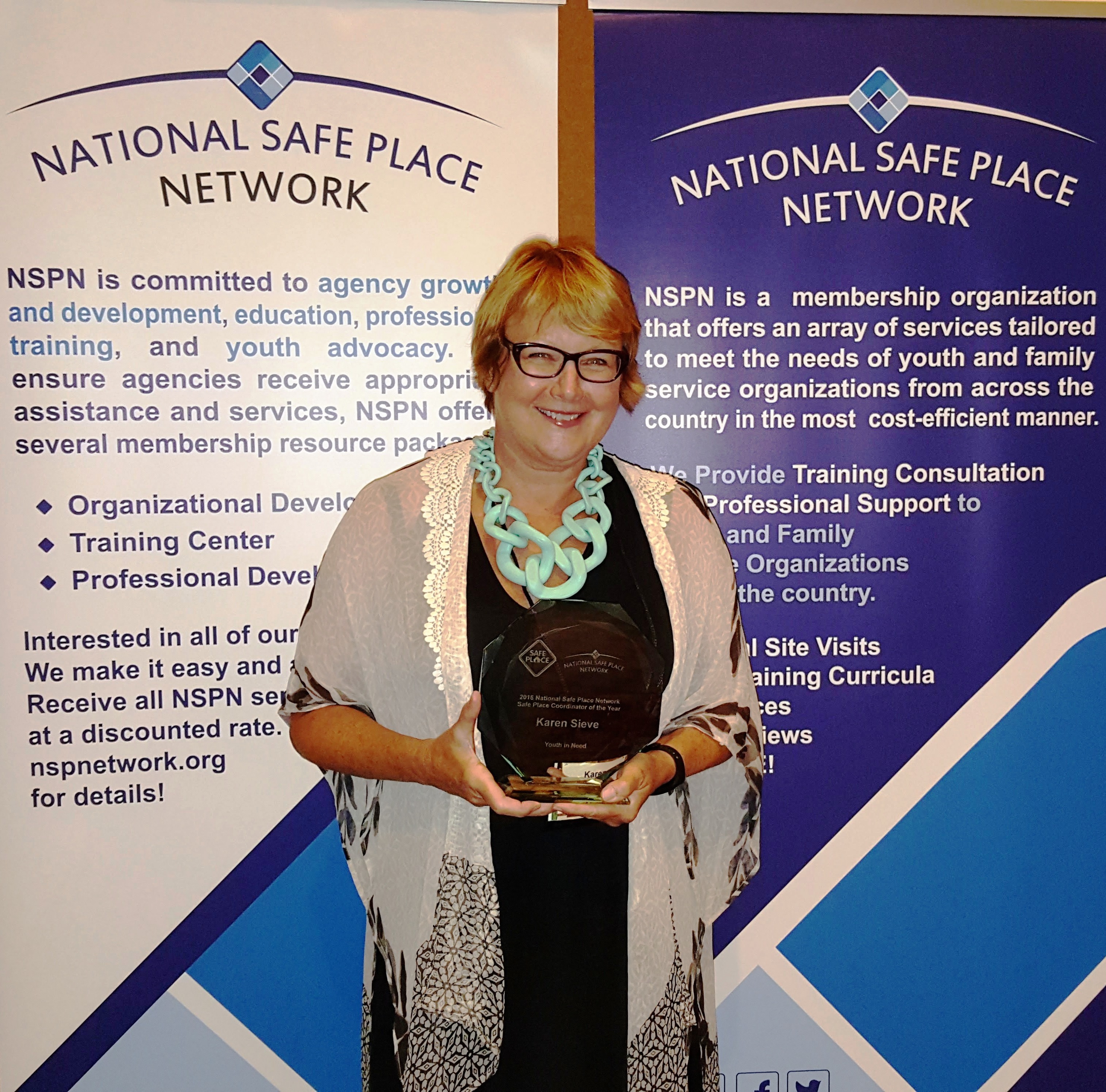
Volunteer of the Year Award
Paul Hamaan, President & CEO of The Night Ministry, is the 2016 Volunteer of the Year. Paul has contributed greatly to his agency and the youth services field. During the past year, he donated his time, expertise, and experience to support NSPN's national conference. Hamaan presented workshops at both Focus 2014 and the 2015 National RHY Grantees Conference, volunteered to facilitate an inspiring keynote youth panel discussion at the conference, and was instrumental in the planning of a pre-conference institute on leadership development. Learn more about Paul Hamaan at: http://www.thenightministry.org/004_about/035_staff/002_bios/010_paul_hamann/
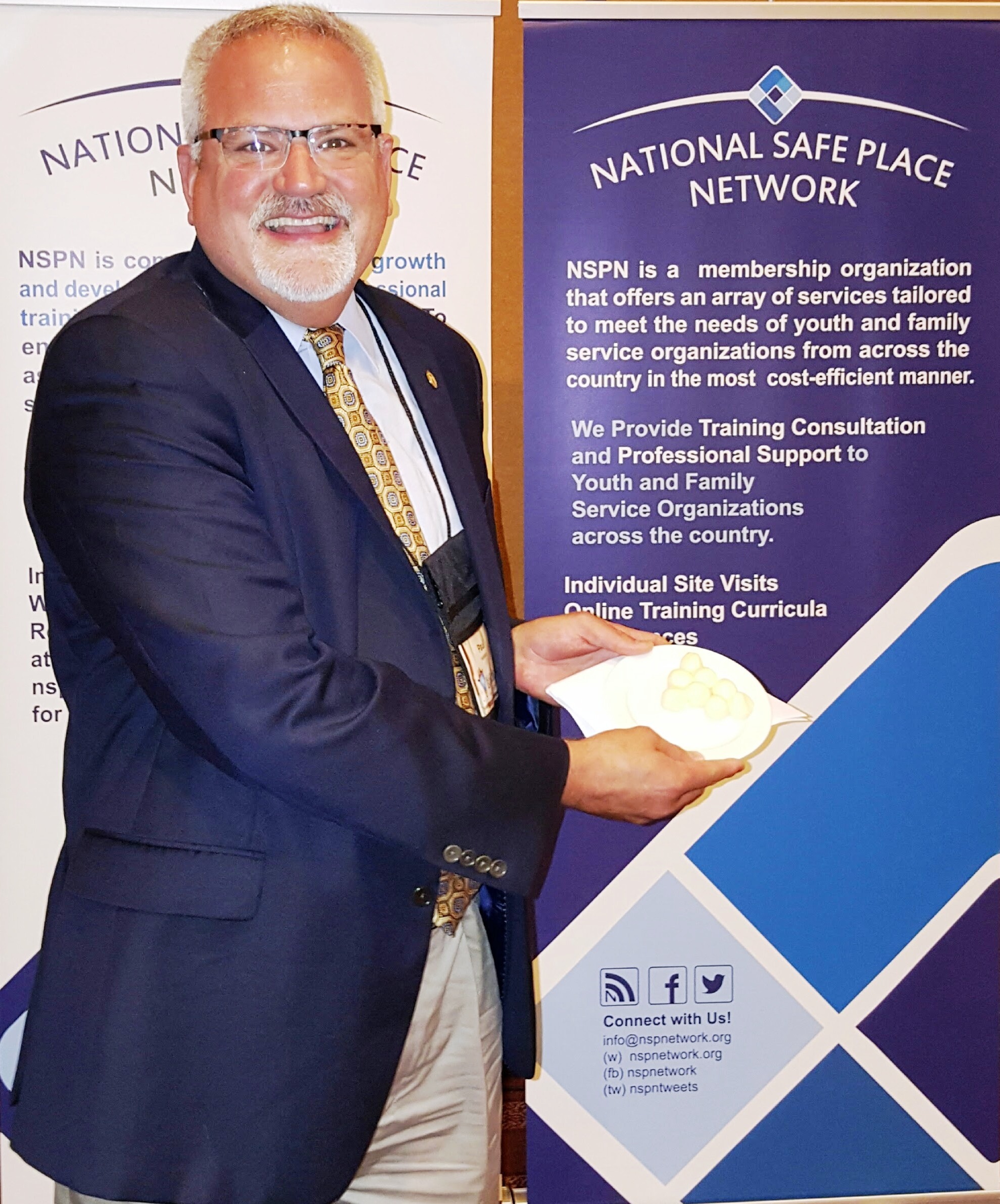
HEROES for Youth Award
Cyndi Lauper, singer/songwriter and Co-founder of True Colors Fund, is the recipient of the 2016 HEROES for Youth Award. Cyndi has worked tirelessly to increase national awareness and advocate on behalf of homeless LGBT youth. She has dedicated time, energy, and resources to educate, advocate, inspire, and empower individuals and communities to support LGBT youth. Cyndi is an outspoken champion for change and NSPN commends her efforts to end LGBT homelessness in America. To learn more about Cyndi and her work with True Colors Fund, please visit: https://truecolorsfund.org/staff/cyndi-lauper/

|
Runaway and Homeless Youth Documentary Screening in St. Pete Beach, Florida
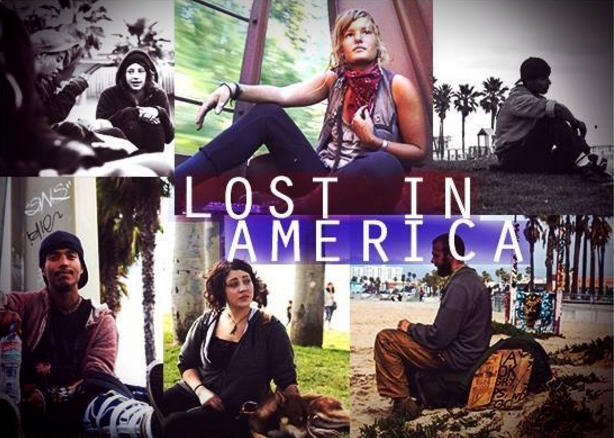
Lost in America is a feature documentary that follows Rotimi Rainwater’s journey to expose the truths about youth homelessness in America. The film takes an all-encompassing look at this pandemic highlight issues like: human trafficking, the foster care system, youth rejected because of their sexuality, domestic violence, abuse, and more. It also examines what many organizations, politicians, and other public figures are doing (or not doing) to help these youth.
The production company will host a public screening of the film on Wednesday, November 16 at 6:30 p.m. at the TradeWinds Island Resorts in St. Pete Beach. The screening will be held in the Tarpon Key / Sawyer Key room just off the Grand Palm Colonnade.
To learn more about Lost in America, please visit: http://www.lostinamericafilm.com/
Click here to view a teaser of the film: https://www.youtube.com/watch?v=A6kEHSNunlI |
NSPN Receives Grant from The UPS Foundation
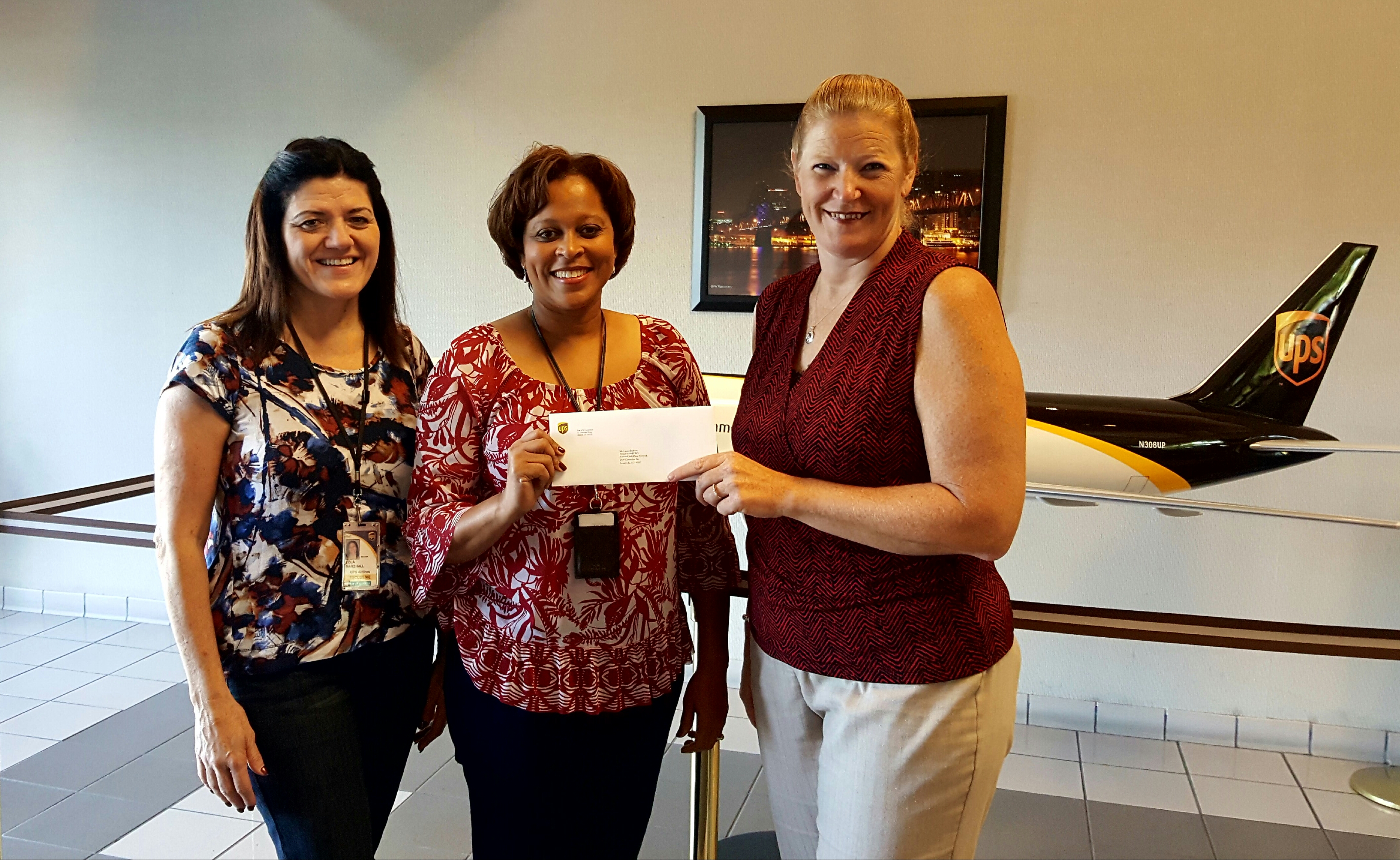
From left to right: Zola Marshall and Rhonda Whitted from UPS's Community Relations Department share the awarded funds with Laurie Jackson, NSPN's President / CEO.
National Safe Place Network (NSPN) received a $22,200 grant from The UPS Foundation to implement the Family Focus Awareness Program which will help create more resilient communities by strengthening families and ensuring the well-being of youth in crisis.
“We are grateful to be selected as a recipient of funding from The UPS Foundation,” said Laurie Jackson, president and chief executive officer of NSPN. “The funds will be used to support the Family Focus Awareness Program which brings together UPS employees and the wider community to help raise awareness of NSPN’s Safe Place program and ensure youth know how to access immediate help in times of crisis.”
The Family Focus Awareness Program will be developed with input from UPS volunteers drawn from the company’s diverse workforce. NSPN will conduct focus groups with UPS employees to gather feedback on the most effective and preferred methods of communicating information about Safe Place with families and youth. The organization will use input from the focus groups to produce a full spectrum of tools and resources to educate youth and adults about Safe Place.
NSPN will execute a replicable Family Focus Awareness Program with families and adults across Greater Louisville and share the program with more than 1,400 Safe Place communities across the country.
“The UPS Foundation is honored to support NSPN’s efforts to supply Safe Place resources to youth and adults, strengthening the national safety net for youth,” said Eduardo Martinez, president of The UPS Foundation and chief diversity and inclusion officer at UPS. “Our goal is to fund powerful programs that make a lasting difference to the global community.”
Established in 1951 and based in Atlanta, Ga., The UPS Foundation identifies specific areas where its backing clearly impacts social issues. In support of this strategic approach, The UPS Foundation has identified the following focus areas for giving: volunteerism, diversity, community safety and the environment.
In 2015, UPS and its employees, active and retired, invested more than $110 million in charitable giving around the world. To learn more about The UPS Foundation, visit www.ups.com/foundation.
About National Safe Place Network
National Safe Place Network (NSPN) provides quality training and technical support for youth and family service organizations across the country. Along with being a leading membership association offering tailored organizational development, training and professional development packages, NSPN also operates the nationally recognized programs Safe Place, HTR3, and the Family and Youth Services Bureau’s Runaway and Homeless Youth Training and Technical Assistance Center (RHYTTAC). To learn more, please visit www.nspnetwork.org. |
|
|
